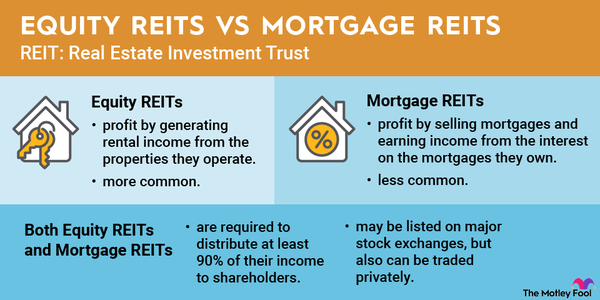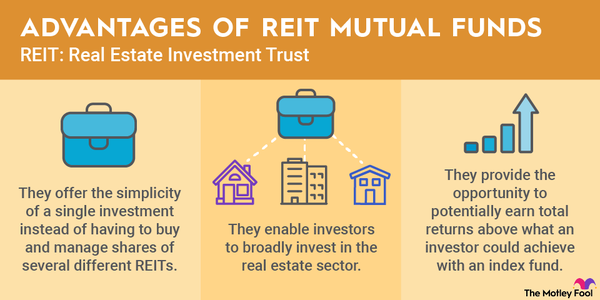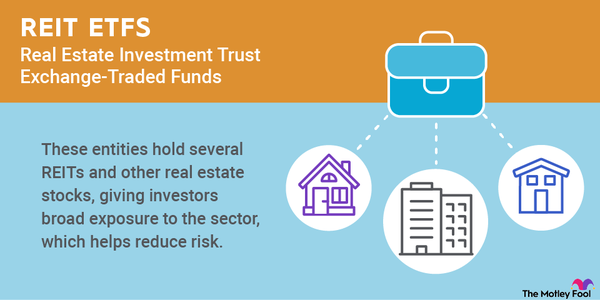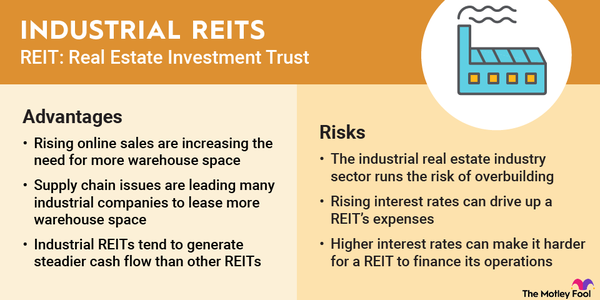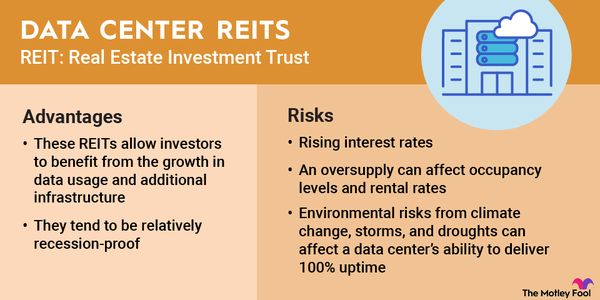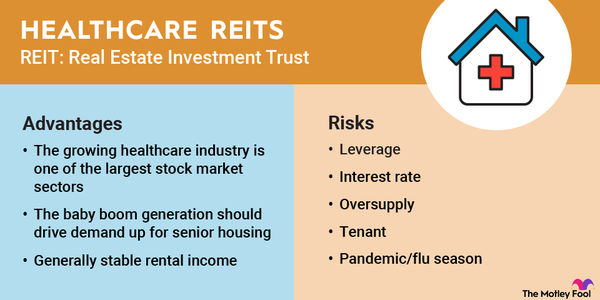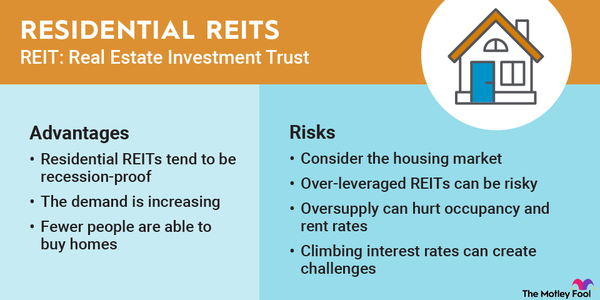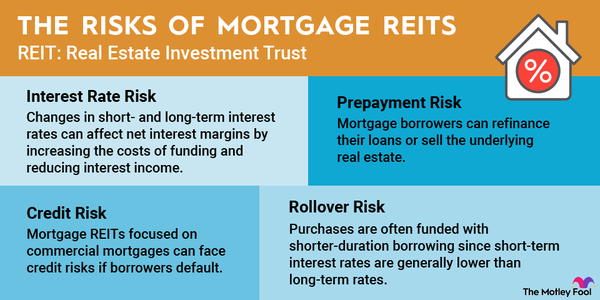Office real estate investment trusts (REITs) own, manage, develop, and rent office space leased to various tenants. These properties range from skyscrapers in the largest U.S. cities to sprawling office campuses in the suburbs. This real estate is crucial for companies that use offices to support their operations.
Here's a closer look at office REITs, including how they work, their advantages and risks, and some top office REITs to consider in 2025.
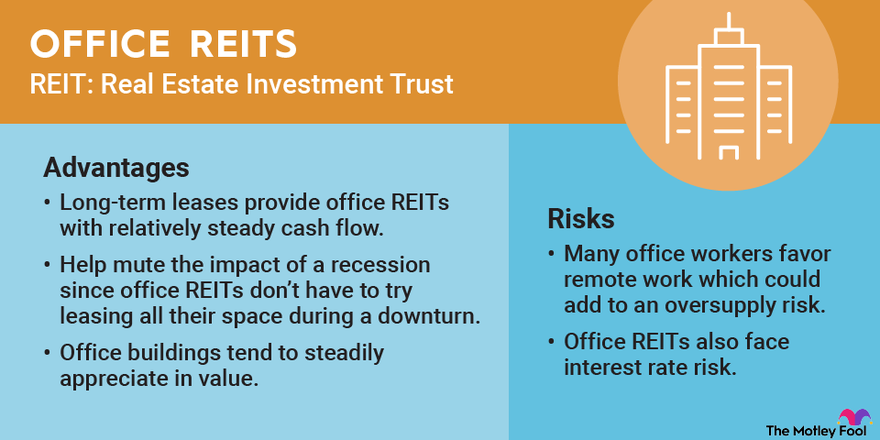
Understanding office REITs
Understanding office REITs
Most office REITs focus on a specific property type, tenant, or location. Some office REITs concentrate on multi-tenant office buildings in central business districts. Office space in these areas tends to remain in high demand, enabling these office REITs to maintain high occupancy levels and benefit from steadily rising rental rates.
Other office REITs focus on large office campuses. They'll often lease whole buildings to a single tenant under long-term triple net leases. Meanwhile, some REITs concentrate on specialized office properties to support the needs of a specific tenant type. These properties can include highly secure buildings for government agencies, creative space for technology and media companies, or specialized lab space for life sciences companies.
Many office buildings earn additional revenue from parking fees, while some large skyscrapers feature an observatory that generates ticket sale revenue. Meanwhile, many office buildings also lease retail space to shops and restaurants.
Advantages
Advantages of investing in office REITs
Most office tenants sign long-term leases. Terms can be five to 10 years for space in multi-tenant office buildings to more than a decade for a single-tenant office net lease. Long-term leases provide office REITs with relatively steady cash flow. They also help mute the impact of a recession since office REITs don't have to try leasing all their space during a downturn.
Meanwhile, demand for office space has been relatively durable. While many companies have adopted a hybrid model that allows their employees to work from home more often, they continue to lease space in offices. They believe having employees together in an office setting can increase collaboration, coordination, and productivity.
Given their stability and durability, office buildings tend to steadily appreciate in value. Their combination of steady income and appreciation make them attractive real estate investments for institutional investors such as pension funds.
Risks
Risks of investing in office REITs
There's still a lot of uncertainty about what the future holds for offices following the COVID-19 pandemic and the rise of remote and hybrid work. Many office workers favor remote work, which has forced more companies to permanently adopt some form of hybrid policy and reduced some of their need for office space.
That has added to the oversupply risk that often plagues the office REIT sector. Developers usually start constructing office buildings on speculation, betting they'll secure tenants before finishing construction. However, if developers build too much supply, this can weigh on occupancy levels and lease rates in certain markets.
Office REITs also face interest rate risk. Office buildings are expensive, requiring REITs to borrow money to acquire and develop these properties. As interest rates rise, they can increase interest expenses if an office REIT uses floating rate debt or has near-term debt maturities. On top of that, rising interest rates increase the income yield on lower-risk investments such as bonds. As a result, REIT stock prices often fall as interest rates rise since the REITs have to boost dividend yields to compensate investors for their higher risk profile.
3 top office REITs to buy
3 top office REITs to buy in 2025
In early 2025, 20 publicly traded REITs focused on owning office properties. Here's a closer look at the three best office REITs for investors to consider:
| Name and ticker | Market cap | Dividend yield | Sector |
|---|---|---|---|
| Alexandria Real Estate Equities (NYSE:ARE) | $13 billion | 7.19% | Real Estate |
| Cousins Properties (NYSE:CUZ) | $5 billion | 4.47% | Real Estate |
| BXP (NYSE:BXP) | $11 billion | 5.78% | Real Estate |
1. Alexandria Real Estate Equities
Alexandria focuses on specialized office space for the collaborative life sciences, agriculture tech, and technology industries. It owns mega campuses in key urban innovation clusters in Boston, the San Francisco Bay Area, New York City, San Diego, Seattle, Maryland, and North Carolina's Research Triangle.
The company's focus on collaborative space has been a key differentiator. Although many office tenants can easily allow their employees to work from home, some work requires in-person collaboration in specialized settings. That includes much of the work in the life sciences sector for the research and development of diagnostic tests, therapeutics, medical devices, and vaccines. That has fueled demand for lab space, boosting occupancy levels and rental rates at Alexandria's facilities. It also provided the company with opportunities to continue expanding its portfolio.
2. BXP
BXP (formerly Boston Properties) is the largest publicly traded developer, owner, and manager of premier workspaces. It owns a large portfolio of Class A office properties, which are modern buildings in the best locations. It focuses on owning properties in six major coastal gateway cities: Boston, Los Angeles, New York, San Francisco, Seattle, and Washington, D.C. The office REIT also has a large and growing life sciences portfolio.
BXP has strategically capitalized on growth regions and sectors in recent years. It has increased its exposure to tenants in the life sciences, technology, advertising, media, and information industries. It's a leading developer of premier workspaces. The office REIT developed $2.4 billion of properties between 2022 and 2024. It had another $2.1 billion of properties under development in early 2025 to drive its continued growth.
3. Cousins Properties
Cousins Properties focuses on Class A office buildings in fast-growing Sun Belt markets. It owns modern office buildings across Austin, Atlanta, Phoenix, Charlotte, Tampa, Houston, Dallas, and Nashville.
Cousins Properties' focus on the Sun Belt region has paid big dividends. The region has benefited from significant migration from cold and expensive cities along the coasts to cheaper and warmer cities in the Sun Belt. Companies are also moving into the region because of better business climates and abundant worker pools. That has enabled Cousins Properties to launch new development projects and make acquisitions to grow its portfolio.
Related investing topics
Growing markets
The top office REITs focus on growing markets
The COVID-19 pandemic has continued to have a lingering effect on the office sector as more companies have allowed employees to work remotely. However, companies still need offices to support their workforces, with many capitalizing on opportunities to upgrade their space to Class A properties and expand their offices to places people want to live, like the Sun Belt region. Office REITs focused on those growth drivers stand out for investor consideration in 2025.
FAQs
Office REITs: FAQs
What are the biggest office REITs?
The biggest office REITs by market cap in early 2025 were BXP, Vornado Realty Trust (NYSE: VNO), and Cousins Properties.
What is an office REIT?
An office REIT is a real estate investment trust (REIT) that owns and manages office real estate like skyscrapers and office parks.
Is there an office REIT ETF?
VanEck Office and Commercial REIT ETF (NYSEMKT: DESK) is an office REIT ETF that aims to track the MarketVector US Listed Office and Commercial REITs Index, which strives to measure the performance of the U.S. office REIT sector. The fund had 25 holdings in early 2025, including BXP and Cousins Properties.
Is there an office REIT index?
Several indexes track office REITs. They include the S&P 500 Office REITs Sub-Industry Index and the MarketVector US Listed Office and Commercial REITs Index.











